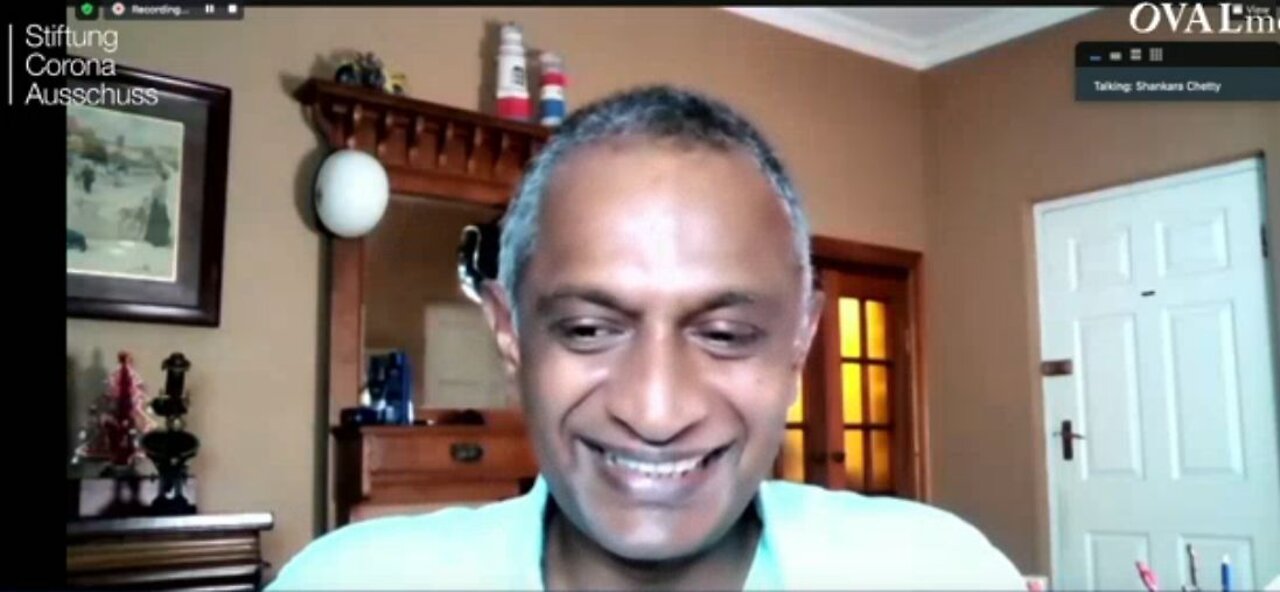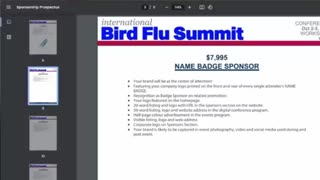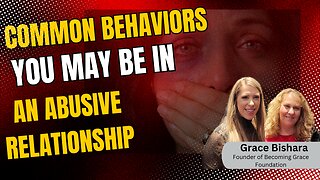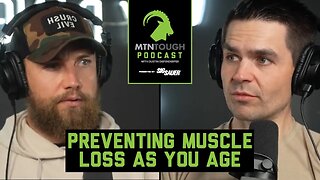Premium Only Content

Dr. Shankara Chetty testifies before the German Corona Investigative Committee, Dec 10th, 2021 (Covid/Vax "Allergy to Spike Protein" Poison)
"We're heading into a Pandemic of Vaccine-Side-Effects"
Dr. Shankara Chetty testifies before the German Corona Investigative Committee, Dec 10th, 2021
Dr. Shankara Chetty is a General Practitioner with a Natural Science background in Genetics, Advanced Biology, Microbiology, and Biochemistry.
Dr. Chetty has personally successfully treated well over 7,000 Covid patients in South Africa since the beginning of the pandemic with on-label drugs. He investigated early on to devise a treatment regime to prevent people becoming critically ill and set up a tent in his parking lot where patients could be out in the sun and fresh air where he began his own clinical study, and through meticulous observation and examining each one of them personally, he was able to discern the nature of Covid-19 as a two-phase illness with a respiratory and an allergic phase.
Testimony notes:
Q.) "I see on Day 8, you see that there can be some kind of auto-immune that causes a lot of problems?"
A.) I examined every patient and took down all their details, to try and understand how to treat. They all had the initial flu-like illness, and it didn't seem much different from an average, viral flu (with some minor differences like the loss of smell/taste). In all the covid patients that I saw, I noticed by the 5th or 6th day they showed signs of recovery. They got their appetites back, their fever broke, and they started to feel better - but there was a sub-set of patients - who would present breathlessness - who came back to me, and there were a few very unusual things. The first thing I noticed was that every patient that developed breathlessness in the first wave, developed it exactly a week after their first symptom. So they would go through the standard flu-like illness, start feeling better, start going back to normal, but exactly one week later, they would get up feeling fatigued, breathless, and by the evening were showing signs of saturation-dropping. So it was very strange that on the 8th day, you were having patients with breathlessness, who on the day before, were perfectly fine. So I knew I was dealing with something that had 2 completely different pathogenestics.
The sub-set of patients with curious day 8 worsening:
So I started looking at the 2nd part. Why was there a sub-set of patients who came back on the 8th day, breathless? Looking at the group, it didn't seem like they had a predisposition to comorbidities. Yes, they were slightly older - but I've had older patients that recovered with severe comorbidities that still recovered relatively quickly. I've had patients in their 50's, absolutely healthy, no comorbidities, that presented on the 8th day with very severe illness. So I couldn't see a pattern really to comorbidity.
Examining them was unusual:
A typical viral pneumonia is a progressive-illness. It starts with an upper-respiratory infection, spreads into a bronchitis, progresses into a pneumonia, and that's where the breathlessness sets in. So typically, you would see the progression on a daily-basis to pneumonia. However with this sub-set of patients, they were perfectly fine the day before, so there wasn't that typical progression that you would see with a viral pneumonia.
The second thing to note, is that in typical viral pneumonia, patients are acutely ill. Whereas with this sub-set, they were breathless & fatigued, but they weren't acutely ill. If you took a step-back from afar, you would think that patient is perfectly fine. So it wasn't the typical presentation of a pneumonia.
The third thing I noticed in clinical examination, these patients had no restriction to air-flow. So air was entering and leaving their lungs unrestricted. Unlike a pneumonia where there is a restriction. This sub-set just couldn't take a "deep breathe". The breathing was rapid and shallow - they were panting.
Some patients on the 8th day had mild symptoms and others had more moderate symptoms, and the only thing that made sense from a pathology perspective was an allergic reaction to an allergen, triggered on the 8th day. So for those patients, I gave steroids, and they recovered within 2-3 days.
So understanding that it was some kind of hyper-sensitivty, I decided to treat as such. So the next patient I also added an anti-histamine, and the very next day she was perfectly fine. But I only gave her 1 day's worth of medication, and when you treat an allergic-reaction, it's got to be suppressed until your muscles actually calm down - if you withdraw treatment too quickly, you'll have a rebound. So I asked my staff to inform her if the breathlessness comes back, she needs to report back immediately, and the following day, the breathlessness resurfaced, and she was started on a full course of antihistamine and she promptly recovered.
From that patient, I was under the impression, that we're not dealing with the covid pneumonia, we are rather dealing with an allergen- instigated: Hypersensitivity Pneumonitis.
On high-definition CT and X-Ray (which is the standard of looking at pneumonia), these 2 conditions cannot be told apart. So I've been under the impression from the start of this pandemic, that the globe has misdiagnosed this illness, as a covid-pneumonia.
Looking at the mediators released when you have an allergic reaction, the 4 main mediators that get released are: histamines, leukotrienes, prostaglandins, and platelet-activating factor.
My protocol of treatment followed that theory early-on.
To the antihistamines, I added Montelukast to deal with the leukotrienes, and added an Anticoagulant (Aspirin as a blood-thinner) for the platelet-activating factor.
If you are treating pneumonia, you have to be very cautious with the steroids, however if you are treating a Hypersensitivity Pneumonitis, the high-dose of the steriod is vitally important. You have to turn the reaction around before it spirals out of control.
It is dependant on your genetic pre-disposition to allergy, rather than any co-morbidity.
Those who had mild symptoms on the 8th day (like a bee-sting), they had mild transient irration in their lung, and that would resolve spontaneously.
The second sub-set would be those that had moderate-reactions, (like a bee-sting that causes a rash throughout your body), and if you left that to be settled on its own, it might take a very long while for your body to rectify that, and that is what we saw as Long-Covid. Long-covid in my opinion is just a moderate allergic reaction triggered on the 8th day, that has been inappropriately treated and left unchecked for too long, so it spirals out of contro.
The third sub-set are those that are severely-allergic to this allergin, and would have a severe-reaction. That would spiral very quickly and would result in severe inflammation in your lungs, and if unchecked would result in a Cytokine storm where they'd put you on a ventilator.
The dose of steroid in the first wave had to be titrated up, and I came to an average dose of about 80mg of Prednisolone as the minimum effective dose. Anything below that, didn't seem to work.
In the first wave, I had no deaths or hospilizations or oxygen, because everyone, no matter how severe, seemed to recover by the next day, and I had not a single patient develop long-covid or any complications.
In the second wave, I was now examining long-covid patients from the first-wave (not treated with my modality), I took the opportunity to record bio-markers to prove my theory of Type I Hypersensitivy.
I needed to show on the 8th day the release of Histamine or Tryptase or an elevated level of Immunoglobulin E (the Immunoglobulin involved in allergic reactions) as these are the common markers, however Tryptase was an expensive test to do, Histamine required a 24 hr urine sample to be collected - and would have to defer treatment which would endanger them, so I couldn't do those tests to prove the 8th day.
However with the long-covid patients, I knew they were exposed to the allergen long enough to have been given sufficient time to have elevated IgG Levels. So I tested them and every single one of them had elevated IgG levels to the point where the normal values ranged up to 100 - whereas the Long-Covid levels were values around 5,000, and I used that as a marker of severity and of course a marker for recovery.
So I put them on a protocol and all of them within 3-4 days, irrespective of how long they were suffering long-covid, showed signs of good recovery. However when you treat of long-covid, because of the length of the injury, some things are irrepairable.
When we got into the second wave, the South Afican variant, the 8th day remained exactly the same, but I was starting to see new gastro-symptoms, runny-tummys, cramping, nausea, vomitting, however on the 8th day, it was more re-emergence of diarroah and an overwhelming sense of fatigue (when the previous day they were perfectly fine). The allergen triggering this process with the Spike Protein. It was the only thing that changed on this variant, which caused those 3 symptoms to change.
The Spike Protein is what gives a virus, its affinity for a particular host.
We've been exposed to coronaviruses throughout history but this is the first time I've seen an "allergic" type of presentation.
So usually when you are exposed to new environments, there's a risk that you will be allergic to something, seeing that it is a new-or-unusul exposure.
I added Plasmoquine - a sub-set of HCQ, just as an antiviral, and it worked well and all patients recovered within 2 or 3 days. That was reserved for a few patients that seemed to have high viral loads.
The rest were treated symptomatically on what might transpire on the 8th day.
So the treatment modality of the 4 waves we've had, has not changed. Every patient is taught about the 8th day.
With an allergic reaction, quick, aggressive, timely intervention is the most vital thing.
In the third wave, the Delta variant, we saw exactly the same thing. There were slight changes in the initial presentation. Changes in the severity of the Hypersensitivy allergy triggered on the 8th day, and changes in the symptoms, but the timeline remained consistant irrespective of which variant I was dealing with.
Viruses tend to have a very set pattern when they infect a human, unlike bacteria. Bacteria can grow indefinitely. Viruses run through so many cycles over a period of so many days, and then they eventually are self-limited by an immune response.
All the mortality and severity of this virus, lies in the 2nd part.
Nobody dies of the first 7 days of viral exposure. It's those that have a severe allergic reaction post 8 day, that have the highest risk of mortality. Those are the ones that would end up in hospital.
Why were over 55's more prone? Over 55 year old patients had been previously exposed to something very similar to this coronavirus. To put that in perspective, if you are allergic to a bee-sting, the first time you will not have a clinical reaction to it, because you don't have the antibodies that would trigger the allergic reaction. But on that first exposure, you could use a specific sub-type of IgG E for that particular allergen. The 2nd time, you are exposed to it, you now have the IgG to mount an inappropriate allergic response to it.
Younger people weren't reacting during the first wave, simply because they have never been exposed to it - it would be their first exposure to the allergen. However, during that first exposure, those that were allergic, would likely be sensitized and would have an allergic reaction with subsequent exposure.
FULL TRANSCRIPT HERE:
https://pennybutler.com/7000-covidpatients-no-deaths/
In the second part he is talking about how he sees the pandemic, long covid, the virus and its variants, the vaccines, and the development of a new medicine, to treat the negative effects from the spike proteins.
Learn more about the committee:
https://corona-ausschuss.de/en
Dr. Reiner Fuellmichs english Telegram channel:
https://t.me/s/ReinerFuellmichEnglish
Full 1hr 50min Testimony (session 82, Dec 10th, 2021).
https://odysee.com/@Corona-Investigative-Committee:5/Dr-Shankara-Chetty-session-82-en:5
================
C19 Updates
================
LinkTree:
https://linktr.ee/JustWantFreedom
-
 25:20
25:20
Censored Important Videos
5 months agoBird Flu Summit 2024
3.6K12 -
 LIVE
LIVE
Quite Frankly
8 hours ago"2024 Review, Homunculus Flu, Old/New Year Predictions" 12/30/24
1,779 watching -
 LIVE
LIVE
RonjnJeremy
11 hours ago $7.52 earnedClassic Wow 20th Anniversary edition HC SF, Rogue..PT8 lvl 46+ Just need to stay alive...
290 watching -
 1:50:28
1:50:28
Jesús Enrique Rosas
7 hours agoEp. 51: Gates wants CENSORSHIP, Colbert MESSES UP, AOC meltdown, Hanks LEAVING and MOAR!
94K50 -
 1:45:47
1:45:47
The Quartering
10 hours agoHuge Censorship Law To Pass, Trump Endorses Johnson, TikTok is Saved? & Today's News!
122K80 -
 55:59
55:59
The Amber May Show
8 hours ago $0.55 earnedCommon Behaviors That May Indicate You Are In An Abusive Relationship| Grace Bishara
16.6K1 -
 1:54:42
1:54:42
MTNTOUGH Fitness Lab
5 hours agoThe MTNTOUGH 8 Week LIVE READY Challenge w/ Kyle Kamp | MTNPOD #97
11.8K -
 2:25:15
2:25:15
WeAreChange
4 hours agoTrump Make CRYPTIC Post! Bill Gates Requested Meeting With Elon Musk At Mar-a-Lago??
22.3K14 -
 53:39
53:39
PMG
3 days ago $2.46 earned"Allegations Against Diddy & Usher, $150K Bounty on Trump, RINO Speaker Caves w/Steve Baker"
20.6K2 -
 1:31:21
1:31:21
Tucker Carlson
9 hours agoBrigham Buhler: UnitedHealthcare CEO Assassination, & the Mass Monetization of Chronic Illness
217K281